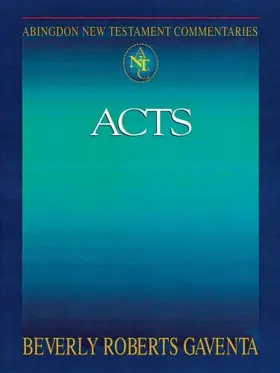

The Acts of the Apostles
in Abingdon New Testament Commentaries
Pages
296 pages
Publisher
Abingdon Press
Published
11/1/2003
ISBN-13
9780687058211
In a striking departure from customary readings of the Acts of the Apostles as the story of the growth of the church, Gaventa argues that Luke's second volume has to do with nothing less than the activity of God. From the beginning of the story at Jesus' Ascension and extending until well past the final report of Paul's activity in Rome, Luke narrates a relentlessly theological story, in which matters of institutional history or biography play only an incidental role. Gaventa pays careful attention to Luke's story of God, as well as to the numerous characters who set themselves in opposition to God's plan.
Collections
This book appears in the following featured collections.
- Commentaries by Female Scholars by John Dyer
- Women and BIPOC by Jamie Davies
- New Testament Commentaries & Monographs by Princeton Theological Seminary
- Nijay Gupta's Top NT Commentaries by Nijay K. Gupta
Reviews
combines erudition and accessibility, two attributes not often found in tandem. Her emphasis on Acts as a story of divine activity provides a welcome and engaging, theological reading of this important book.
It is not surprising that this outstanding short commentary on Acts has garnered endorsements from well-known Lukan scholars representing a broad range of theological traditions. This commentary is brief enough to be practical for a wide range of users, but those familiar with Acts studies will also recognize that it is informed by a wide range of scholarship. Like other commentaries in this series, this one approaches the text passage by passage rather than focusing on individual verses. Such an approach is ideal for a commentary this size, and Luke-Acts offers one of the most fruitful fields for such an approach. By focusing on the unity of Luke-Acts and reading passages as cohesive units, Gaventa develops the �message� and �theology� that run throughout Luke-Acts, thereby surfacing Luke�s theological concerns. Her emphasis on larger literary units does not prevent the author from engaging more detailed questions where they arise, but it does provide a natural bridge for the synthetic theological analysis with which she follows such discussions. Because she helpfully reads Luke�s language in each particular passage in the light of Luke�s language and themes th roughout Luke-Acts, every passage is richly informed by Luke�s use of analogous language or concepts elsewhere. Although this is a fresh reading, it is in the highly insightful tradition of Lukan literary critics such as Robert Tannehill and F. Scott Spencer.
[Full Review]


